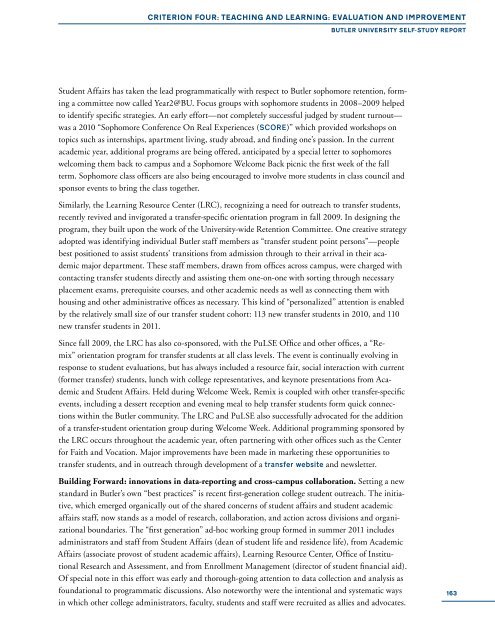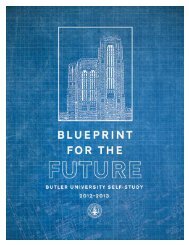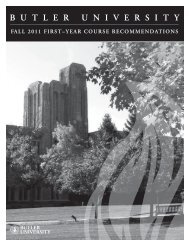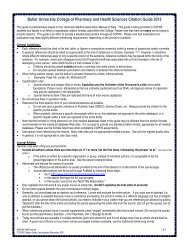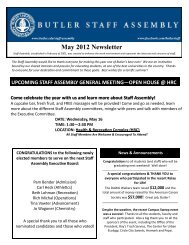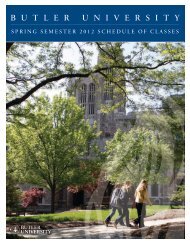Untitled - Show Answer - Butler University
Untitled - Show Answer - Butler University
Untitled - Show Answer - Butler University
Create successful ePaper yourself
Turn your PDF publications into a flip-book with our unique Google optimized e-Paper software.
CRITERION FOUR: TEACHING AND LEARNING: EVALUATION AND IMPROVEMENT<br />
BUTLER UNIVERSITY SELF-STUDY REPORT<br />
Student Affairs has taken the lead programmatically with respect to <strong>Butler</strong> sophomore retention, forming<br />
a committee now called Year2@BU. Focus groups with sophomore students in 2008–2009 helped<br />
to identify specific strategies. An early effort—not completely successful judged by student turnout—<br />
was a 2010 “Sophomore Conference On Real Experiences (SCORE)” which provided workshops on<br />
topics such as internships, apartment living, study abroad, and finding one’s passion. In the current<br />
academic year, additional programs are being offered, anticipated by a special letter to sophomores<br />
welcoming them back to campus and a Sophomore Welcome Back picnic the first week of the fall<br />
term. Sophomore class officers are also being encouraged to involve more students in class council and<br />
sponsor events to bring the class together.<br />
Similarly, the Learning Resource Center (LRC), recognizing a need for outreach to transfer students,<br />
recently revived and invigorated a transfer-specific orientation program in fall 2009. In designing the<br />
program, they built upon the work of the <strong>University</strong>-wide Retention Committee. One creative strategy<br />
adopted was identifying individual <strong>Butler</strong> staff members as “transfer student point persons”—people<br />
best positioned to assist students’ transitions from admission through to their arrival in their academic<br />
major department. These staff members, drawn from offices across campus, were charged with<br />
contacting transfer students directly and assisting them one-on-one with sorting through necessary<br />
placement exams, prerequisite courses, and other academic needs as well as connecting them with<br />
housing and other administrative offices as necessary. This kind of “personalized” attention is enabled<br />
by the relatively small size of our transfer student cohort: 113 new transfer students in 2010, and 110<br />
new transfer students in 2011.<br />
Since fall 2009, the LRC has also co-sponsored, with the PuLSE Office and other offices, a “Remix”<br />
orientation program for transfer students at all class levels. The event is continually evolving in<br />
response to student evaluations, but has always included a resource fair, social interaction with current<br />
(former transfer) students, lunch with college representatives, and keynote presentations from Academic<br />
and Student Affairs. Held during Welcome Week, Remix is coupled with other transfer-specific<br />
events, including a dessert reception and evening meal to help transfer students form quick connections<br />
within the <strong>Butler</strong> community. The LRC and PuLSE also successfully advocated for the addition<br />
of a transfer-student orientation group during Welcome Week. Additional programming sponsored by<br />
the LRC occurs throughout the academic year, often partnering with other offices such as the Center<br />
for Faith and Vocation. Major improvements have been made in marketing these opportunities to<br />
transfer students, and in outreach through development of a transfer website and newsletter.<br />
Building Forward: innovations in data-reporting and cross-campus collaboration. Setting a new<br />
standard in <strong>Butler</strong>’s own “best practices” is recent first-generation college student outreach. The initiative,<br />
which emerged organically out of the shared concerns of student affairs and student academic<br />
affairs staff, now stands as a model of research, collaboration, and action across divisions and organizational<br />
boundaries. The “first generation” ad-hoc working group formed in summer 2011 includes<br />
administrators and staff from Student Affairs (dean of student life and residence life), from Academic<br />
Affairs (associate provost of student academic affairs), Learning Resource Center, Office of Institutional<br />
Research and Assessment, and from Enrollment Management (director of student financial aid).<br />
Of special note in this effort was early and thorough-going attention to data collection and analysis as<br />
foundational to programmatic discussions. Also noteworthy were the intentional and systematic ways<br />
in which other college administrators, faculty, students and staff were recruited as allies and advocates.<br />
163


